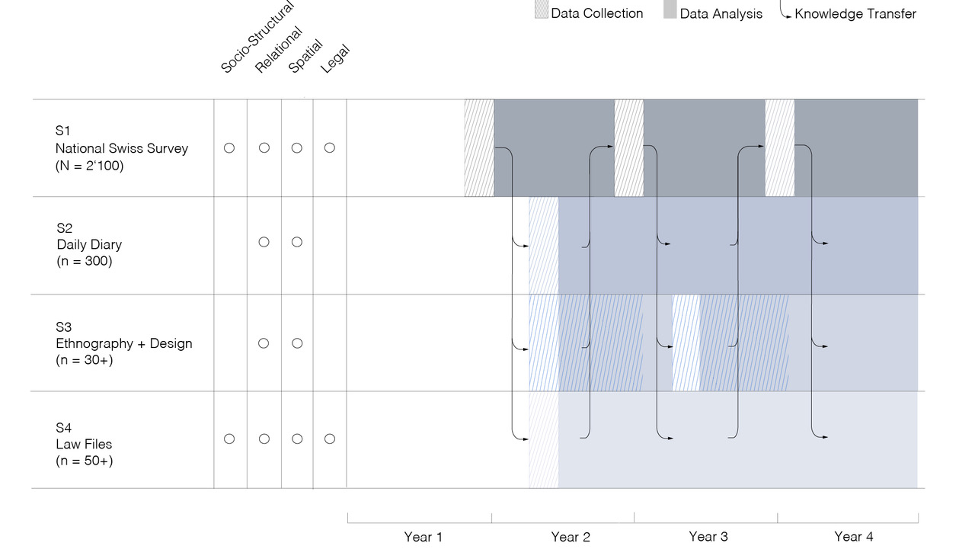SNSF Sinergia «Family Custody Arrangements and Child Well-Being in Switzerland. The Role of Housing and Architecture» (FamyCH)
The ETH Wohnforum – ETH CASE sub-project examines the relationship between housing, architecture, and children's well-being following parental separation. It aims to identify risk and resilience factors for children in Switzerland.

In 2019 in Switzerland, more than one in ten people with children under 18 are no longer in a relationship with the other parent. This results in Swiss children growing up within a diversity of custody arrangements and often having multi-local residence across parental households. Fathers have also become more involved over time, which has changed the patterns and the distribution of time that children spend with each parent. However, we still know very little about the extent to which custody arrangements are stable and how they relate to child well-being over time. Our project will thus focus on post-separation custody arrangements and their impact on children contributing to the identification of risk and resilience factors for child well-being after parental union dissolution in Switzerland.
Building on the insights of social demography, psychology, architecture and housing studies, and law, this SNSF funded interdisciplinary project investigates the effects of four key dimensions on child well-being:
1. Socio-structural (social inequalities within and between families)
Prof. Laura Bernardi / Universily of Lausanne
2. Relational (interpersonal relationships between family members
Prof. Joëlle Darwiche / University of Lausanne
3. Spatial (housing arrangements, architecture, and mobility)
Prof. Elli Mosayebi / ETH Zürich
4. Legal (legal regulations and court decisions)
Prof. Sabrina Burgart / University of Neuchâtel
In light of the growing diversity of physical custody arrangements in Switzerland, family policies and the legal framework need to adapt to the needs of all children. By linking the analysis of large-scale panel data with innovative and intensive approaches, the project will produce empirical evidence needed to further theory, research, and practice, to inform legal and housing market actors, and serve children’s developmental and psychological needs in Switzerland. This knowledge can guide professionals and parents in making decisions that are best for the children.

Methods
- (S1) Nationally representative longitudinal survey on families’ post- separation custody arrangements in Switzerland including an examination of all four dimensions over 24 months (3 waves)
- (S2) Daily diary data on family conflict dynamics
- (S3) Longitudinal qualitative data on housing, architecture, and mobility
- (S4) Qualitative study on legal decisions
Sub-Project "Spatial Dimension – housing, architecture, and mobility" (ETH Wohnforum)
- Focuses on socio-spatial practices in physical custody arrangements of
families after seperation and divorce and how they relate to child well-being
- Examines housing arrangements, practices, and conditions of families after
seperation and divorce
- Analyses apartment layout and set-up, quality and emotional atmosphere of rooms,
and spatial mobility practices
- Explores children’s and their parents’ experiences of housing practices in different
post-seperation custody arrangements
- Develops new, adaptive floor plan types for new ways of co-residence
2023-2027
Sub-project ETH Zurich
- Prof. Dr. Elli Mosayebi (Chair for architecture and design, ETH Zurich)
- Dr. Tino Schlinzig (ETH Wohnforum – ETH CASE, ETH Zurich)
- Carina Sacher (ETH Wohnforum - ETH CASE, ETH Zurich)
Project partner
- Prof. Dr. Laura Bernardi (Chair of family demography, University of Lausanne)
- external page Prof. Dr. Joëlle Darwiche (Chair of couple and family psychology, University of Lausanne)
- external page Prof. Dr. Sabrina Burgat (Chair of civil law and private health law, University of Neuchâtel)
Project website
